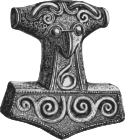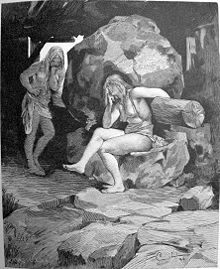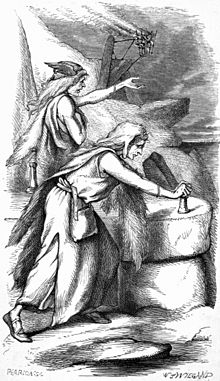- Grottasöngr
-
"Grotte" redirects here. For other uses, see Grotte (disambiguation).Fenja and Menja at the mill. Illustration by Carl Larsson and Gunnar Forssell.

Grottasöngr[1] or the Song of Grótti is an Old Norse poem, sometimes counted among the poems of the Poetic Edda as it appears in manuscripts that are later than the Codex Regius. The tradition is also preserved in one of the manuscripts of Snorri Sturluson's Prose Edda along with some explanation of its context.
The myth has also survived independently as modified Scandinavian fairy tales, one of them called Why the Sea Is Salt, collected by Peter Christen Asbjørnsen and Jørgen Moe in their Norske Folkeeventyr. Moreover, Gróttasöngr had great social and political impact in Sweden during the 20th century as it was modernized in the form of Den nya Grottesången by Viktor Rydberg.
Contents
Poetic Edda
Though not originally included in the Codex Regius, Gróttasöngr is included in many later editions of the Poetic Edda.[2] Gróttasöngr is the work song of two young slave girls bought in Sweden by the Danish King Frodi. The girls are brought to a magic grind stone to grind out wealth for the king and sing for his household.
The girls ask for rest from the grinding but are told to continue. Undaunted in their benevolence, the girls proceed to grind and sing, wishing wealth and happiness for the King. The King, however, is still not pleased and continues to order the girls to grind without interruption.
King Frodi is ignorant of their lineage and the girls reveal that they are descended from mountain giants. The girls recount their past deeds, including moving a flat-topped mountain and revealing that they had actually created the grinding stone they are now chained to. They reveal that they had advanced against an army in Sweden and fought "bearlike warriors",[3] had "broken shields",[3] supported troops and overthrew a prince while supporting another. The girls recount that they had become well known warriors.
The girls then reflect that they had now become cold and dirty slaves, relentlessly worked, and living a life of dull grinding. The girls sing that they are tired and call to King Frodi to wake up so that he may hear them. The two state that an army is approaching, that Frodi will lose the wealth they've ground for him, that he will also lose the magic grindstone, that the army will burn the settlement and overthrow Frodi's throne in Lejre. The girls are grinding an army into existence via the magic stone. They then comment that they are "not yet warmed by the blood of slaughtered men".[3]
The girls continue to grind even harder and the shafts of the mill-frame snap. The two then sing a prophecy of vengeance mentioning Hrólfr Kraki, Yrsa, Fróði and Halfdan:
- Mölum enn framar.
- Mun Yrsu sonr,
- niðr Halfdanar,
- hefna Fróða;
- sá mun hennar
- heitinn verða
- burr ok bróðir,
- vitum báðar þat.
- Let us grind on!
- Yrsa's son,
- Hálfdan's kinsman,
- will avenge Fródi:
- he will of her
- be called
- son and brother:
- we both know that.[4]
Now filled with a great rage, the girls intensely grind until finally the grinding mechanism has collapsed and the magical stone has split into two. With the impeding army soon to arrive, one of the two girls finishes the song with:
- Frodi, we have ground to the point where we must stop,
- now the ladies have had a full stint of milling![3]
Prose Edda
Snorri relates in the Prose Edda that Skjöldr ruled the country that we today call Denmark. Skjöldr had a son named Friðleifr who succeeded him on the throne. Friðleifr had a son who was named Fróði who became king after Friðleifr, and this was at the time when Caesar Augustus proclaimed peace on earth and the Christian figure Jesus was supposedly born. The same peace ruled in Scandinavia, but there it was called Fróði's peace. The North was so peaceful that no man hurt another, even if he met his father's or his brother's killer, free or tied. No man was a robber and a golden ring could rest on the moor of Jelling for a long time.
King Fróði visited Sweden and its king Fjölnir, and from Fjölnir he bought two female slave giantesses named Fenja and Menja who were big and strong. In Denmark, there were two big mill stones which were so big that no man was strong enough to use them. However, the man who ground them could ask them to produce anything he wished. This mill was called "Grótti" and it had been given to Fróði by Hengikjopt.
Fróði had Fenja and Menja tied to the mill and asked them to grind gold, peace and happiness for himself. Then he gave them neither rest nor sleep longer than the time of a song or the silence of the cuckoo. In revenge Fenja and Menja started to sing a song named the "song of Grótti" (the poem itself) and before they ended it, they had produced a host led by a sea-king named Mysing. Mysing attacked Fróði during the night and killed him, and left with rich booty. This was the end of the Fróði peace.
Mysing brought Grótti as well as Fenja and Menja and asked them to grind salt. At midnight, they asked Mysing if he did not have salt enough, but he asked them to grind more. They only ground for a short while before the ships sank. A giant whirlpool (maelstrom from Mal -mill and ström -stream) was formed as the sea started rushing through the centre of the mill stone. Then the sea begun turning salt.
Toponyms
According to popular tradition,[citation needed] the islands of Fanø and Mandø, off the west coast of Denmark, are named after Fenja and Menja.
References
- ^ Or Gróttasöngr, the length of the first vowel is not known for certain.
- ^ 1907 edition of the Nordisk familjebok. Viewable online via Project Runeberg here:[1]
- ^ a b c d Larrington, Carolyne. The Poetic Edda: A new translation by Carolyne Larrington (1996) ISBN 0192839462
- ^ Thorpe's translation
External links
- Gróttasöngr in Old Norse from «Kulturformidlingen norrøne tekster og kvad» Norway.
- Grottasöngr (Old Norse)
- Grottasöngr (English)
- Den nya Grottesången in Swedish from «Kulturformidlingen norrøne tekster og kvad» Norway.
Norse paganism Deities,
heroes,
and figuresOthersAsk and Embla · Dís (Norns · Valkyries) · Dwarf · Einherjar · Elves (Light elves · Dark elves) · Fenrir · Hel · Jörmungandr · Jötunn · Sigurd · Völundr · Vættir
Locations Asgard · Bifröst · Fólkvangr · Ginnungagap · Hel · Jötunheimr · Midgard · Múspellsheimr · Niflheim · Valhalla · Vígríðr · Wells (Mímisbrunnr · Hvergelmir · Urðarbrunnr) · YggdrasilEvents Sources Society See also The Poetic Edda Mythological poems Völuspá · Hávamál · Vafþrúðnismál · Grímnismál · Skírnismál · Hárbarðsljóð · Hymiskviða · Lokasenna · Þrymskviða · Völundarkviða · AlvíssmálNon-Codex RegiusBaldrs draumar · Rígsþula · Hyndluljóð (Völuspá hin skamma) · Svipdagsmál (Grógaldr · Fjölsvinnsmál) · Gróttasöngr · Hrafnagaldr ÓðinsHeroic Lays Codex RegiusHelgi LaysNiflung CycleJörmunrekkr LaysNon-Codex RegiusLater poems Manuscripts See also Categories:- Old Norse literature
- Eddic poetry
- Sources of Norse mythology
Wikimedia Foundation. 2010.


